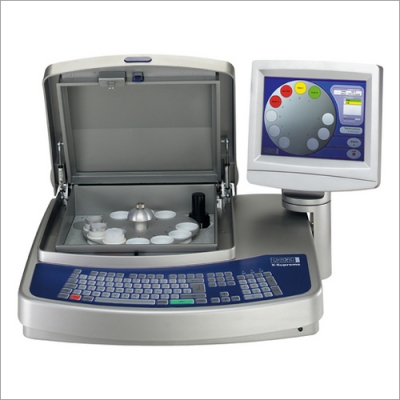- Civil Lab Mechanical Lab Engineering Lab Equipments
- sales@didacticlabequipments.com

CAT NO: DIDACTICNPS0050
X-Ray Spectrometer.
X-RAY SPECTROMETER This X-ray spectrometer has been designed specifically for teaching physics. It includes many experiments (starting from basic concepts of
X rays to more complex tests).
The system is a spectrometer that can easily be adapted to become: a wide beam of X rays for examining the general properties of X rays
a Bragg diffractometer with a range accuracy of 5 minutes of arc
a powder diffraction camera for Debye-Scherrer experiments with accuracy up to 30 minutes of arc
an emitter of fluorescent radiation for the study of Moseley’s law stating that each element is characterized by its own atomic number
an experimental region for the preparation of innovatory studies chosen by teachers.
Students can easily read calibrations and scales on this X-ray machine.
The system can be controlled by PC via X-Driver.
A lot of safety and protection devices from X rays have been integrated in the system with proper absorption shields.
The safety switches prevent any operation if all the covers are not safely closed and set in operating position.
The unit can be motorized by adding a motor that can be installed inside the equipment.
TRAINING PROGRAM
With the basic system, the students can perform more than 10 experimental X-ray readings using photographic technics and the Geiger Muller tube.
it is possible to study:
Laue X-ray diffraction,
Bragg diffraction on single crystals and X-ray emission
the X-rays properties like the rectilinear propagation, the square inverse ratio, the penetration and the absorption.
COMPONENTS
Motorized spectrometer with Geiger Muller tube
X-Driver
Basic accessory kit
Film and Chemicals for 20 radiographs
Film and Chemicals for 12 Powder camera experiments
X-DRIVER
X-Driver comes complete with everything you need to automate data taking with the spectrometer.
Take data from 12 to 120 degrees with a maximum resolution of 0.05 degrees.
The time per step is also adjustable, and can be as little as .1 sec.
Scans can be obtained for all 4 of the crystals available: NaCl, LiF, KCl, and RbCl.
An additional feature includes the ability to scan powders and foils.
The X-Driver is USB powered.
A Geiger Muller tube can be connected directly to this unit, negating the need for an additional scalar or ratemeter.
Software allows selection of scan angles, resolution, and time/step.
Data is automatically saved every 30 seconds thus preventing the loss of data during a long scan in the event of a power failure.
Once the experiment is completed the software permits zoom-in on the data and the facility to add comments to the file.
Data can be exported to a spreadsheet for further analysis.
BASIC ACCESSORY KIT
A Kit of 26 components includes Collimators, Luminescent Screen, Film Cassettes and all the items necessary to perform more than 30 experiments.
Thin foils of Nickel, Copper, Cobalt and Zinc are included which are used to evaluate the Mass Absorption Coefficient.
They are also used in conjunction with a Rotary Radiator which presents these 4 elements, and in addition Iron, Vanadium, Manganese and Chromium, to the primary X-ray beam.
These 8 elements are sequential in the Periodic Table and secondary emission from them is analyzed to verify Moseley’s Law.
The classical Bragg relationship can be established using large single crystals of Sodium Chloride and Lithium Fluoride and additionally Planck’s Constant can be derived from the minimum wavelength cutoff.
Small minicrystals of LiF are included to record Laue and upper layerline photographs.
Finely divided LiF powder and copper wire strands can be used to demonstrate Debye-Scherrer analytical techniques with a special self-locating Powder Camera.
In addition to the basic configuration, to study the Moseley law, the Debye-Scherrer dust diffraction and the atomic number effect on the unitary cell dimension of salt crystals, it is possible to add the crystallographic kit (optional) while to perform some research in radiography and know all the X-rays properties, it is possible to add the radiographic kit (optional).
CRYSTALLOGRAPHY KIT
This kit of 16 prepared elements is intended to supplement the Basic Kit.
For a more comprehensive study of Moseley’s Law four more thin foil slides are included. They are Iron, Vanadium, Manganese and Chromium. Together with the 4 slides in the Basic Kit, there can now be 8 thin foil slides to be used in conjunction with the 8 -element Rotary Radiator.
There are 5
vials of finely divided powders, 2 vials of drawn wire and large
single crystals of Potassium Chloride and Rubidium Chloride.
All of these materials are used in a carefully integrated study of
the salient features of crystallographic analysis.
RADIOGRAPHY KIT
This kit is designed for teaching X-ray applications for nondestructive testing.
It includes 16 components with which the production and properties of X-rays can be studied.
Additional emphasis is given to scattering, differential absorption and linear absorption coefficients; to the relationship between penetration, resolution and exposure time, accelerating voltage and tube current
